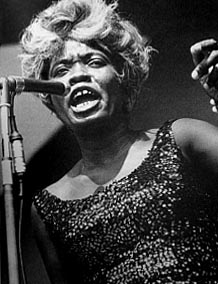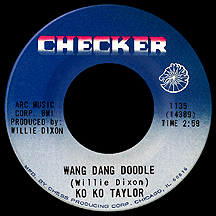KO KO TAYLOR
Wang Dang Doodle
Willie Dixon had been writing songs for Howlin' Wolf for some time, usually meeting with resistance, 'cause the Wolf preferred material he'd written himself. Around the spring of 1960, six years or so into their troublesome relationship at Chicago's Chess Records, one song that set off a disagreement was "Wang Dang Doodle." Wolf made it clear he disliked the rough-and-tumble tune Willie had written in the early '50s, railing about how "old-timey" it was with its cast of made-up characters like "Automatic Slim," "Razor Totin' Jim" and "Ol' Pistol Pete." Still, Willie had his way and the record was made, though the vocals, while typically raw and as scarily wolflike as ever, seemed a bit sloppy; Wolf even got the title wrong, delivering it as 'Wang WANG Doodle.' But what producer, may I ask, would demand he redo it, further aggravating such an imposing figure of a man? The finished take was served up on a seven-inch disc in early 1961 and quickly forgotten...until a woman later tackled Willie's words and the "Doodle" took hold for good.
Tennessee cotton picker Cora Walton, growing up just outside Memphis as a sharecropper's daughter, couldn't get enough chocolate (when she could get it at all), and thus emerged her lifelong nickname, "Ko Ko." She admired the blues women of her childhood, Bessie Smith, Ma Rainey and Memphis Minnie, but it was many years before she made any attempt to follow their lead. Moving to Chicago in 1953, she worked as a housecleaner and frequented nightclubs in her offtime, catching acts like Jimmy Reed and Elmore James during their prime, as well as Chess Records blues icons Muddy Waters, Howlin' Wolf and others. Of the era's female vocalists she was most attracted to the way Big Maybelle delivered a song; patterning herself after the husky-voiced singer, she nevertheless insisted she simply set out "...to sound like Ko Ko."
By the late '50s, Ko Ko Taylor had begun singing in those same blues clubs, sometimes joining her idols onstage. Willie Dixon happened in one night and became her manager. Her first recording was made in 1961 for the U.S.A. label with the encouragement of friend and former Chess/Checker bluesman J.B. Lenoir. With Dixon arranging the session, "Like Heaven to Me" and "Honky Tonky" revealed strong and assertive vocals. Dixon helped secure her a contract with Chess (on the roster of its Checker label imprint) in 1964; "I Got What it Takes" got things rolling. A mellow blues with Walter Horton playing harmonica, her growling vocal cut deep, establishing a future trademark sound.
The next single, "Don't Mess With the Messer," was a less bluesy production, with sax blowers and R&B backing singers, yet Ko Ko's contribution didn't waver from the hardened blues stance of her earlier discs. During what turned out to be an eight year affiliation with the label, Dixon had complete control over Taylor's fate as an artist; he wrote most of the songs, produced and arranged, hired the musicians for the sessions and managed her nightclub and concert schedule. Her job was, simply, to belt out those vocals as only she could. Willie's control over Ko Ko was all-encompassing in a way he'd attempted, but had never been able to exercise to such an extent, over several other Chess artists through the years, Howlin' Wolf in particular being the most headstrong of the pack.

Dixon decided to take another stab at making "Wang Dang Doodle" into the hit he always knew it could be. Ko Ko took a less ferocious approach than Howlin' had, obvious only if the two recordings are compared back-to-back. Willie supplied backing vocals as both he and Ko Ko tore through the lyrics in a Wolf-influenced way; she had no problem name-dropping the song's colorful fictional partygoers ("Butcher Knife Totin' Annie," "Fast Talkin' Fanny," "Abyssinian Ned," "Boxcar Joe" and others with names even more extreme) while diving headfirst into the climactic phrase that can be interpreted in one of only two or three ways: 'We gonna pitch a wang dang doodle all night long!' The record was more successful than anticipated; a big seller, it spent a few weeks in the R&B top ten in May 1966 while having a nice mid-chart pop singles run that spring. Ko Ko was in her thirties when this breakthrough occurred, a long wait that had finally paid off...and she was going to make the most of it.
The Dixon-Taylor team was responsible for a number of outstanding blues singles and albums over the next few years; some tracks, like "Egg or the Hen" ('Which come first?') were tough as nails. Others were downright deranged, such as "Insane Asylum" in '68, a duet more Willie than Ko Ko: 'I went out to the insane asylum...and I found my baby out there...,' his baby, of course, being the Toll House munchin' Madwoman of Memphis. Creatively, the team produced music worthy of greater success, but there were no more hits. Taylor, Dixon and Chess/Checker parted ways in 1972, after which she modified her first name to the one-word "Koko," formed The Blues Machine Band, and recorded for a couple of small labels.
For a time, at least, studio work took a back seat to her live shows as her fan base expanded considerably. In 1975 she signed with another Chicago label, Alligator, earning a Grammy Award nomination right off the bat for the album I Got What it Takes, in the category of Best Ethnic or Traditional Recording. Highly regarded among her peers from this point onward, she received many more nominations and won a Grammy in 1984 as one of six artists on Atlantic's Blues Explosion album, recorded live at the '82 Montreux Jazz Festival (her contribution being an extended "Wang Dang Doodle" jam). She appeared in director David Lynch's 1990 film Wild at Heart and the 1998 big screen movies Blues Brothers 2000 and Mercury Rising, but as I can attest from catching her show one smoke-filled evening in the 1980s, Koko Taylor's expertise was in performing live, an inherent talent that endeared her to millions.


